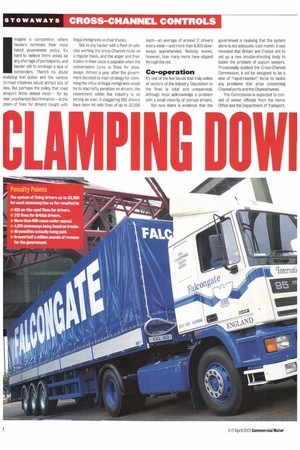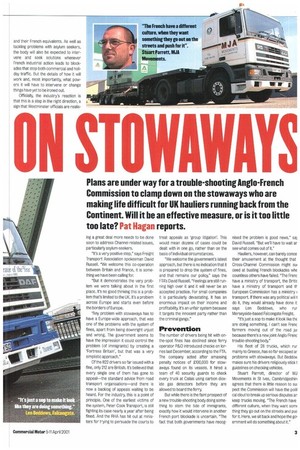CLA
Page 34

Page 35

If you've noticed an error in this article please click here to report it so we can fix it.
PING
ovI
N STOYIAYIAYS
Plans are under way for a trouble-shooting Anglo-French Commission to clamp down on the stowaways who are making life difficult for UK hauliers running hack from the Continent. Will it be an effective measure, or is it too little too late? Pat Hagan reports.
magine a competition where hauliers nominate their most hated government policy. It's hard to believe there would be any shortage of participants, and harder still to envisage a lack of contenders. There's no doubt scalating fuel duties and the various lti-road initiatives would attract lots of )tes. But perhaps the policy that road .ansport firms detest most— for its )eer, unashamed discrimination —is the /stem of fines for drivers caught with
illegal immigrants on their trucks.
Talk to any haulier with a fleet of vehicles working the cross-Channel route on a regular basis, and the anger and frustration in their voice is palpable when the conversation turns to fines for stowaways. Almost a year after the government decided its main strategy for stemming the influx of illegal immigrants would be to slap hefty penalties on drivers, the resentment within the industry is as strong as ever. A staggering 882 drivers have been hit with fines of up to £2,000 each—an average of around 17 drivers every week—and more than 4,500 stowaways apprehended. Nobody knows, however, how many more have slipped through the net.
Co-operation
It's one of the few issues that truly unites all sectors of the industry. Opposition to the fines is total and unequivocal, although most acknowledge a problem with a small minority of corrupt drivers.
But now there is evidence that the government is realising that the system alone is not adequate. Last month, it was revealed that Britain and France are to set up a new trouble-shooting body to tackle the problem of asylum seekers. Provisionally dubbed the Cross-Channel Commission, it will be designed to be a kind of "rapid-reaction" force to tackle any problems that arise concerning Channel ports and the Channel tunnel.
The Commission is expected to consist of senior officials from the Home Office and the Department of Transport, and their French equivalents. As well as tackling problems with asylum seekers, the body will also be expected to intervene and seek solutions whenever French industrial action leads to blockades that stop both commercial and holiday traffic. But the details of how it will work and, most importantly, what powers it will have to intervene or change things have yet to be ironed out.
Officially, the industry's reaction is that this is a step in the right direction, a sign that Westminster officials are realis ing a great deal more needs to be done soon to address Channel-related issues, particularly asylum-seekers.
"It's a very positive step," says Freight Transport Association spokesman David Russell. 'We welcome this co-operation between Britain and France, it is something we have been calling for.
"But it demonstrates the very problem we were talking about in the first place. It's no good thinking this Is a problem that's limited to the UK. It's a problem across Europe and starts even before the borders of Europe.
"Any problem with stowaways has to have a Europe-wide approach, that was one of the problems with the system of fines, apart from being downright uniust and wrong. The government seems to have the impression it could control the problem (of immigrants) by creating a 'Fortress Britain', but that was a very simplistic approach."
Of the 822 drivers so far issued with a fine, only 212 are British. It's believed that every single one of them has gone to appeal—the standard advice from road transport organisations—and there is now a backlog of appeals waiting to be heard. For the industry, this is a point of principle, One of the earliest victims of the system, Peter Cook Transport, is still fighting its case nearly a year after being fined. And the RHA has hit out at ministers for trying to persuade the courts to treat appeals as 'group litigation'. This would mean dozens of cases could be dealt with in one go, rather than on the basis of individual circumstances.
"We welcome the government's latest approach, but there is no indication that it is prepared to drop the system of fines, and that remains our policy," says the ETA's David Russell. "Feelings are still running high over it and it will never be an accepted practice. For small companies it is particularly devastating. It has an enormous impact on their income and profitability It's an unfair system because it targets the innocent party rather than the criminal gangs."
Prevention
The number of drivers being hit with onthe-spot fines has declined since ferry operator RIO introduced checks on lorries last December, according to the FTA. The company acted after amassing penalty notices of £100,000 for stowaways found on its vessels. It hired a team of 40 security guards to check every truck at Calais using carbon dioxide gas detectors before they are allowed to board the ferry.
But while there is the faint prospect of a new trouble-shooting body doing something to stem the tide of immigrants, exactly how it would intervene in another French port blockade is uncertain. "The Fact that both governments have recog
nised the problem is good news," sas David Russell. "But we'll have to wait ar see what comes out of it."
Hauliers, however, can barely conce their amusement at the thought that Cross-Channel Commission might sui seed at busting French blockades whE countless others have failed. "The Frenc have a ministry of transport, the BritiE have a ministry of transport and tt European Commission has a ministry transport. If there was any political will 1 do it, they would already have done it says Len Beddows, who rur Merseyside-based Falcongate Freight.
"It's just a sop to make it look like thE are doing something. I can't see Frenc farmers moving out of the road ju: because there's a new joint Anglo/Frenc trouble-shooting body" His fleet of 28 trucks, which rur mainly to Greece, has so far escaped ar problems with stowaways. But Beddovi makes sure his drivers religiously stick 1 guidelines on checking vehicles.
Stuart Parrott, director of MJ Movements in St Ives, Cambridgeshin agrees that there is little reason to su: pact the Commission will have the poll.' cal clout to break up serious disputes at keep trucks moving. "The French have different culture, when they want semi thing they go out on the streets and put for it. Here, we sit back and hope the go, ernment will do something about it."
























































































